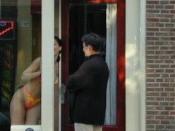One of the most heatedly-debated topics in strip clubs, bars, and the underground brothels that flourish in the shadows of many large cities is the case concerning the legalization of prostitution. Prostitution is known as "the world's oldest profession," having been in existence since the times of the ancient Sumerians and Babylonians. Research results show that over a million females in the United States are full-time prostitutes. Prostitution, or the politically correct term "sex work," was also used by the ancients for religious purposes. Hong Kong, the Netherlands, and our own state of Nevada have licensed sex work in ten of its thirteen counties. Hong Kong forbids it in brothels, but allows it within one's own home. Both the Netherlands and Nevada require a license and regular check-ups for venereal diseases. Now the decision that is being discussed is whether to allow this ancient profession to thrive under United States law, or keep it illegal as it is in most other countries in the world.
One of the most commonly voiced opinions of the conservative world and feminist activists are against the trafficking of women. Decriminalization of the sex industry does not control prostitution, they claim. It encourages it. In fact, it benefits it by funding pimps, madams, traffickers, and other sex workers. It also increases the statistics of child prostitution, and of immigrants being shipped to the Americas for use in brothels and sex clubs. Legalization of the sex industry does not assure protection from abuse for the women involved. "The legalization or decriminalization of the sex industry can not erase the stigma of prostitution, but, instead, makes women more vulnerable to abuse because they must register and lose anonymity," one sex worker said. Also, as the feminists argue, the sex industry encourages men to think of...


